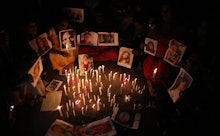On Trans Day of Remembrance, we must do much more than remember

Communities all over the United States and the world will hold ceremonies Sunday for Transgender Day of Remembrance to memorialize trans people who have lost their lives to violence. These events typically culminate in reading the names of victims and lighting candles in their memory.
The 25 people who have died this year of anti-trans violence in the United States marks the highest number of documented deaths since 1999, surpassing the 24 murders of 2015, the second-highest year on record, according to Mic's count. Clearly, remembrance is not enough, especially in the face of the persecution and harassment sure to come with President-elect Donald Trump's forthcoming administration. What's needed is for the broader trans community, its allies, LGBTQ organizations and the public to prevent violence against trans people in the first place rather than memorialize us as passive victims.
Trans people aren't just surviving anymore.
There's no doubt that Gwendolyn Ann Smith, the founder of Transgender Day of Remembrance, or TDOR, had the best intentions when she started the tradition in 1999 to memorialize her friend Rita Hester, a young trans woman of color who was stabbed more than 20 times in Allston, Massachusetts. Hester's murder remains unsolved. On TDOR's 15th anniversary in 2013, Smith wrote: "It is a reminder that we have to continue to fight, to struggle, and to survive." Having transitioned in the early 2000s, I know what it's like to feel as though being trans was primarily about survival — just living without fear of attack seemed like a lofty goal.
But trans people aren't just surviving anymore. When we were less visible and considered mentally ill, remembering those of us who've been murdered might have been enough to make us feel acknowledged. But the intervening years have empowered trans people not just to fight for our basic right to live, but to demand we be treated with the same respect and dignity as everyone else, and to live free from harassment and violence. With our voices resounding more loudly than ever before, TDOR has increasingly fallen out of step with the power our community holds.
What mere remembrance doesn't capture is transgender people's courage to live in active and willful defiance of prejudice. Those who sacrificed their lives to be who they are — the vast majority trans women of color and gender-nonconforming femmes — were not passive victims to be remembered and mourned. They were fighters and rebels who challenged the norms of our society, their communities and often their families.
More important, many more trans people are alive and struggling than dead. They remain not just uncelebrated but unsupported in their continued fight to exist. They continue to experience bullying in schools, discrimination when they apply for jobs and face danger when they are forced to turn to marginal forms of labor like survival sex work to sustain themselves. Their government not only provides few resources for trans people, but often makes it harder to live their day-to-day lives, including laws that dictate where they should go to the bathroom and shelter systems that do not respect their gender.
I recently spoke to black trans activist Aaryn Lang, who described what it has been like for her to experience Transgender Day of Remembrance in her hometown of Columbus, Ohio, a state that has seen nine murders of trans people since 2012, all of them women, seven of them black. "It almost to me feels like people gathering every other day of the year could have done something to prevent or to shift what was going on in this community," she said.
How many people who attend TDOR ceremonies spend significant amounts of time working to alleviate the discrimination and poverty that pervades the lives of many transgender victims of violence? How many count people like most of those who have died — poor, transfeminine people of color — among their close friends and loved ones?
Coming together to remember victims of violence must serve not as a single occasion to mourn loss, but as impetus for working toward a future in which such violence — and the conditions that promote it — is eradicated. It means working toward recognizing and respecting trans people in public institutions like law enforcement and the media. It means advocating against measures that endanger trans people like North Carolina's anti-trans HB2 law, which requires transgender people to use the bathroom based on their assigned gender. It means addressing rampant bullying and employment discrimination that forces so many trans women in the United States to engage in survival sex work, which leaves them vulnerable to violence.
At an individual level, it means befriending and helping vulnerable trans people — emotionally, socially and economically — so their chances of being victims of violence diminish.
If the trans community, allies and LGBTQ organizations reserve one day a year to light candles for the dead, it's vital to spend the other days fighting for the living. Otherwise, Transgender Day of Remembrance functions not as a true memorial for the fallen, but merely a way to comfort those who want to end transgender violence but are not inclined to take the difficult steps to eradicate it.